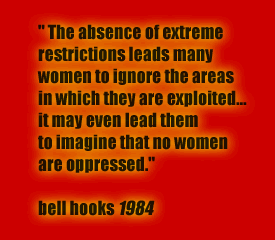|
|

Contemporary African-American Thought: the 1980s
TOPICS >>>
The Paradox of Desegregation:
Segregation created separate
internal markets
Impact on black owned businesses
Threat to historically black colleges
black " brain drain"
black middle class/professional migration from central cities
Erosion of black social institutions
Absence of an easily identifiable structure of racial power
Post-black leadership:
Leaders who happened to be black,
rather than black leadership;
Thomas Bradley, Colin Powell, Douglas Wilder, David Dinkins
Drugs and Violence:
Early 1980s 500,000 drug addicts/heroin,
cocaine, IV users
Mid-1980s introduction of crack
Drug economy at $150 billion by 1989
Blacks represent 15% of all drug users;
37% of all drug-related arrests; over 50 % of those convicted
Urban violence driven by drug markets
Black male homicide rate-- 37 per hundred thousand in 1960
65 per one hundred thousand in 1980
white w 1/606
white m 1/186
black w 1/124
black m 1/29
New York, Detroit, LA 1/20
Cultures of Death; cultural manifestation in Gangsta Rap
Death Row/etc.
Massive Growth of the Prison-Industrial Complex:
1983 650,000
l999 l.9 million in jails,
prisons, incarceration
probation-- after incarceration; awaiting trial
Profile of prisoners:
One-third 20-29 yrs.
California-- 40%; Baltimore 56%
10% of black men 18-54 yrs. old
massive expansion of prison construction
California-- 1 univ./21 prisons, 1980-1998
State of New York-- prisons vs. public universities
Prison guards: 340,000 by 1999
growth of privately managed prisons by corporations;
outsourcing of jobs inside prisons-- prison labor at subminimum
wages
Attack on Civil Rights:
Reagan-- Two thirds
of all white voters 1984
80 percent of all southern whites
80 percent of all evangelical Christians
commitment to dismantle affirmative action, civil rights
William Bradford Reynolds, assist attorney general Clarence Thomas, director
of Equal Employment Opportunity Commission
refused to set minority hiring goals, lack of enforcement
In l983, Reagan fired three liberal members of the US Commission on Civil
Rights;
hired Linda Chavez, ex-director, and Clarence Pendleton, chair
Conservatives on the US Supreme Court:
Rehnquist, Scalia, Anthony Kennedy,
Bork (defeated)
Basemore v. Friday-- Supreme Court declared that minorities using
firms in
discrimination cases had to prove intent to discriminate, not just illustrate
patterns of racism by statistical information-- 1985
Wygant v. Jackson Board of Education: Supreme Court upheld the use of
racial goals and timetables-- in 1986, eroded this decision with
Antonio v. Wards Cove Packing company;
in 1989, alleged victims of racial discrimination had to prove not only
that a specific policy of their employers discriminated, but that such
practice did not serve "legitimate business goals"
The New Black conservatives:
Clarence Thomas; Glenn Loury;
Walter Williams,
Glen Loury, Thomas Sowell-- economists;
media-- Tony Brown; Samuel Pierce, secretary of HUD;
Robert Woodson, pres., National Center for Neighborhood Enterprise;
Thaddeus Garret, Bush's assistant; Arthur Teele, director of Urban Mass
Transit Administration
l983:
Harold Washington campaign: coalition of blacks, Latinos, and liberal
whites, gays/lesbians, labor, Jewish voters
Boston: unsuccessful campaigning of Mel King, Rainbow Coalition
1984: Jesse Jackson's Rainbow Coalition; presidential
campaigns of 1984 and l988
PERSONALITIES >>>
Harold Washington
Jesse Jackson
Douglas Wilder (Governor
of Virginia)
Ron Dellums
John Conyers
Randall Robinson
Audre Lorde
bell hooks
Assata Shakur
READINGS >>>
Giddings, When
and Where I Enter, Chapters
XIX and XX, pp. 337-357.
Marable, Race, Reform
and Rebellion, Part of Chapter
VII, "Reaction: The Demise of the Second Reconstruction, 1976-1982," pp.
163-184, and Chapter VIII, "The Paradox of Integration: Black Society
and Politics in the Post-reform Period, 1982-1990," pp. 185-219.
Marable and Mullings, eds.,
Let Nobody Turn Us Around,
Section Five, Numbers 4-9, pp. 535-577.
MULTIMEDIA >>>
Music:
Grand Master Flash and the Furious Five - "The
Message" (1982)
Artists Against Apartheid - "Sun
City" (1985)
Public Enemy - "Night
of the Living Baseheads" (1987)
KRS-ONE - "My
Philosophy" (1988)
Public Enemy - "Fight
the Power" (1989)
Queen Latifah - "Ladies
First" (1989)
KRS-ONE - "You
Must Learn" (1989)
The Stop the Violence Movement
- "Self
Destruction" (1989)
West Coast All-Stars - "We're
All in the Same Gang" (ca. 1990)
Speeches: Jesse Jackson
- "Address
to the 1984 Democratic National Convention"
Films: T.V. clip of
Miami urban rebellion, May 1980. Harold Washington elected mayor of Chicago,
1983, film clip of speech. Anti-apartheid demonstrations across the U.S.,
1985-86, film clips. Jesse Jackson's Rainbow Coalition campaigns, 1984,
1986, speeches or film clips of related events.
|










